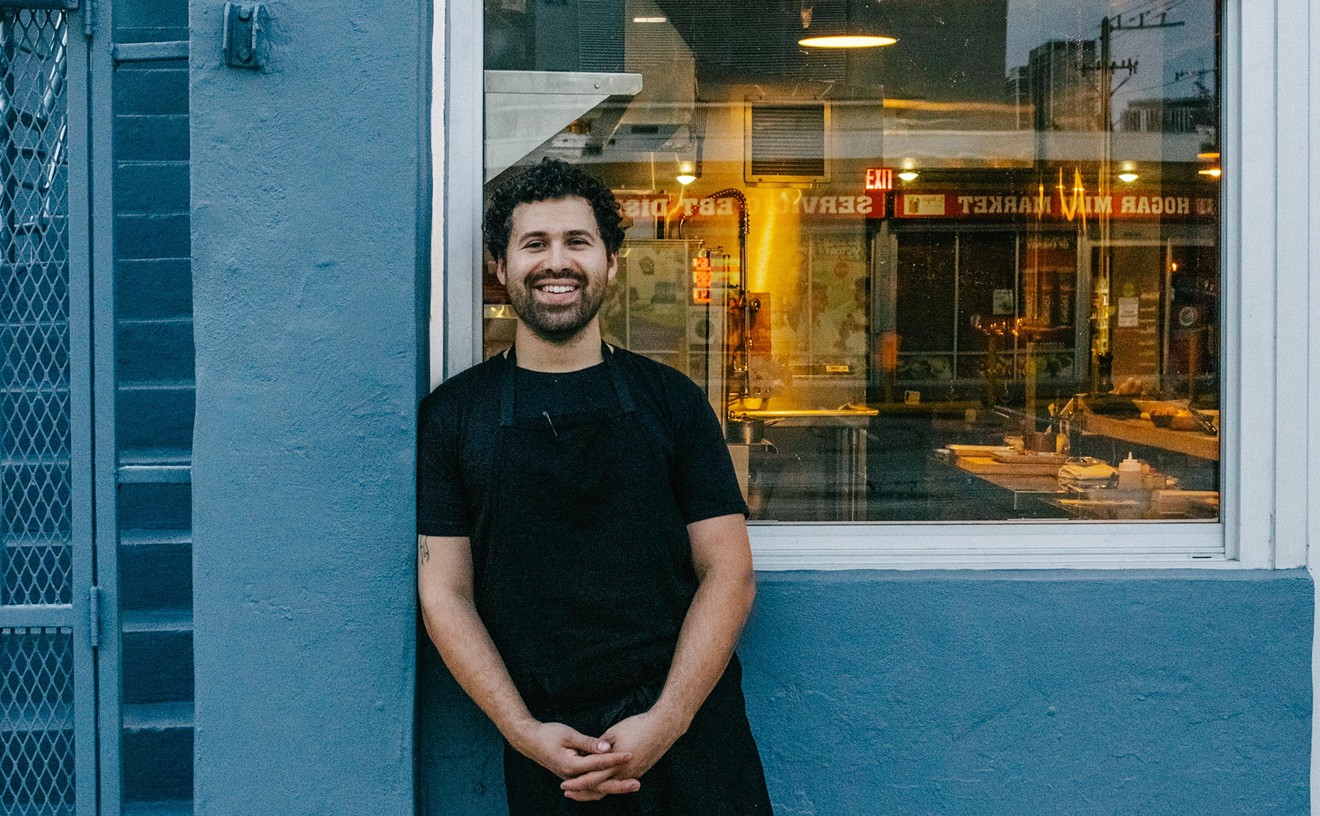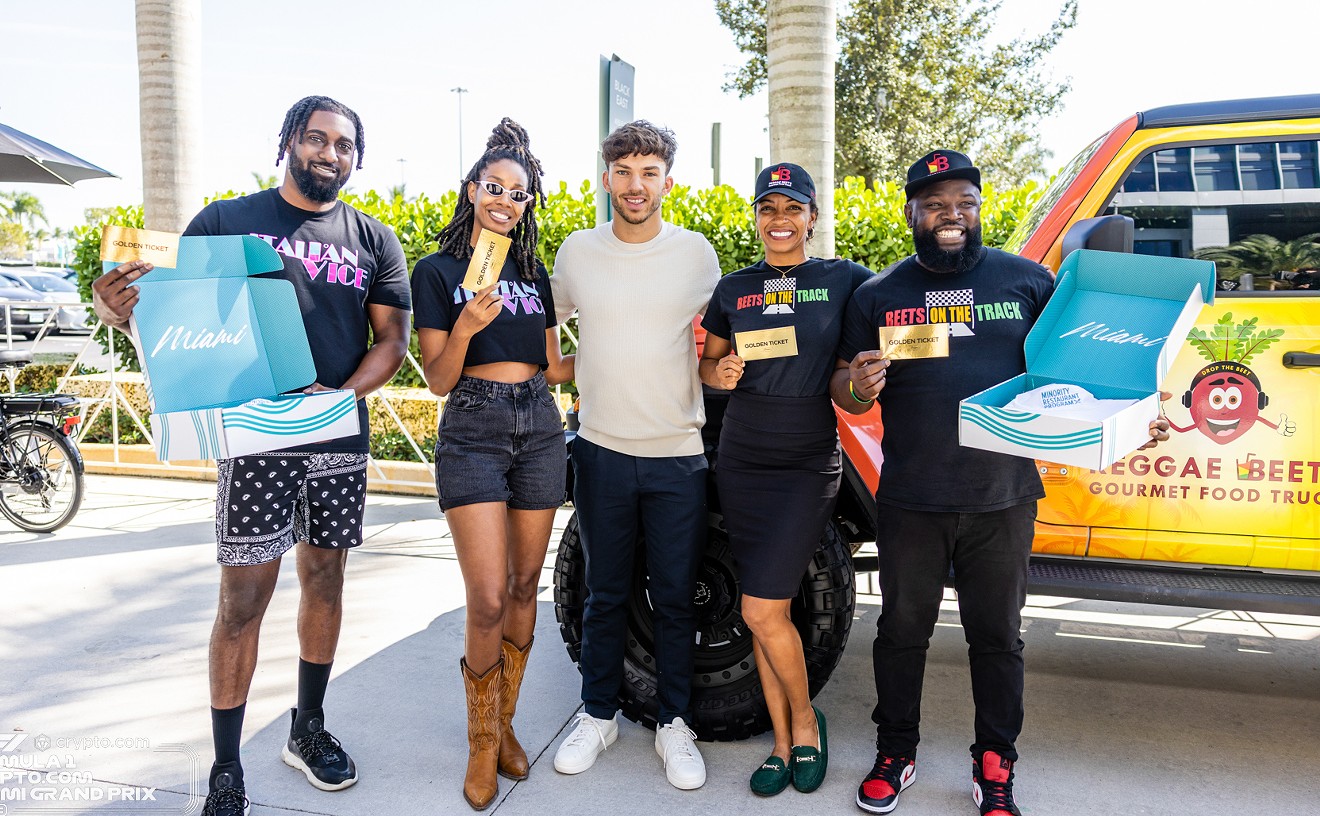Last weekend, tens of thousands of people braved the scorching Miami heat index to purchase baby mango trees and fruit smoothies at Fairchild Tropical Botanic Garden's annual mango festival. Although the festival is a highlight in the garden's yearly events calendar, Fairchild plays a much more important role in the future of mangoes.
The garden is also host of a summit, where mango growers, distributors, and scientists gather to discuss the future of the fruit. Everything from how to grow a heartier variety to the best ways to market the fruit are discussed in this day-long session, which attracts about 70 professionals from the United States, the Caribbean, South American, and as far away as India and Pakistan.
At a display table, Dr. Noris Ledesma, Fairchild's curator of tropical fruit, points out a strange small fruit the color of oxidized iron. "This mango grows wild in Borneo, but they're in danger of extinction. We brought them here are the trees are making fruit already, but now we have to cross them."
At Fairchild Farm in Homestead, Ledesma plays matchmaker between the exotic wild mango tree and the Emerald, a Floridian species that's disease tolerant and grows mangoes valued for their sweet flesh, without the aid of genetic engineering. "I won't participate in that," Ledesma says. Instead, baby trees are made the old fashioned way — using the birds and the bees, so to speak. The two "parent" trees are kept together in netting and bees are introduced to pollinate. The hopeful result? A new breed of mango that has the best attributes of its elders. "We then analyze the progeny, the babies, to see how they are doing. that's my job." Most times, the results are positive. "We are using old technology, but it works. Sometimes we make science more difficult than it has to be. I believe that nature, itself, is so savvy."
Ledesma helps nature along by speeding up the trees' natural aging process. "Plants are different than animals. We age in years, and they age in cycles." The cycling process is helped along by pruning trees and planting them with others. "Trees planted together compete with each other," Ledesma explains.
Fairchild experiments with new trees to find ways to help growers tackle some serious issues like extending a mango's short harvest season and improving heartiness and overall quality of the fruit. Right now, the tropical fruit expert says the market is ripe with possibilities. "The United States market wants more American-grown mangoes. The quality of imported mangoes are so bad, that there's really no way to go but up regarding standards. You can create whatever you want."
So, what would be the ultimate mango? A variety that's hearty to grow and produces fruit annually. The taste and appearance of the mango itself is a matter of preference, with some people liking tart, green mangoes while others seek sweet, custardy flesh. Also on Ledesma's wish list for a perfect mango would be shorter trees so that you could just reach up and harvest the fruit, and more mangoes with edible skin so that the entire fruit can be consumed.
In Miami, the average tropical fruit grower works on small farms of between one and 30 acres. Because land is expensive, farmers are looking for ways to extend the growing season from May through September without the assist of chemicals. The answer may be in diversification of crops. Richard Lyons, who has a ten-acre nursery in southwest Miami, says that that can pose other risks. "Your customer is going to be happier if you have mangoes for four months. The downside is that growers want an early harvest to get their crops before hurricane season starts." Though Miami hasn't had a hurricane in years, one strong storm can blow away a season's worth of profit in a day.
Still, it takes a passionate person to grow things, and Ledesma is passionate about mangoes. After walking me through a mango tasting (including the rare fruit from Borneo and its romantic set-up, the American Emerald), Ledesma says that she's pleased that people are eating more fruits and vegetables. "I see good changes in the United States in general and our community is moving forward. People are tired of eating poorly and being sick because of it and we are doing something about that. What is better than that?"
Follow Laine Doss on Twitter, Instagram, and Facebook.
[
{
"name": "Air - MediumRectangle - Inline Content - Mobile Display Size",
"component": "19274298",
"insertPoint": "2",
"requiredCountToDisplay": "2"
},{
"name": "Editor Picks",
"component": "17482312",
"insertPoint": "4",
"requiredCountToDisplay": "1"
},{
"name": "Inline Links",
"component": "18711090",
"insertPoint": "8th",
"startingPoint": 8,
"requiredCountToDisplay": "7",
"maxInsertions": 25
},{
"name": "Air - MediumRectangle - Combo - Inline Content",
"component": "17482310",
"insertPoint": "8th",
"startingPoint": 8,
"requiredCountToDisplay": "7",
"maxInsertions": 25
},{
"name": "Inline Links",
"component": "18711090",
"insertPoint": "8th",
"startingPoint": 12,
"requiredCountToDisplay": "11",
"maxInsertions": 25
},{
"name": "Air - Leaderboard Tower - Combo - Inline Content",
"component": "17482313",
"insertPoint": "8th",
"startingPoint": 12,
"requiredCountToDisplay": "11",
"maxInsertions": 25
}
]










